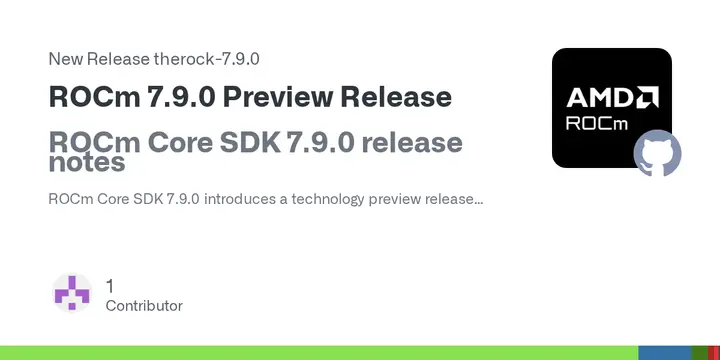The release adopts a fully open and transparent development process, with public release candidates and nightly builds, alongside a predictable 6-week release cycle. However, users are cautioned that this preview is not compatible with earlier production releases (7.0-7.8) and is not intended for production workloads.
Hardware support currently includes AMD Instinct MI350 Series GPUs and APUs, MI300 Series GPUs and APUs, as well as Ryzen AI Max+ PRO and Max APUs. Operating system support is limited to specific versions of Ubuntu and RHEL, with future releases expected to expand hardware support.
The ROCm 7.9.0 includes essential components for development, such as HIP, LLVM, and various math and compute libraries. Users should be aware of known issues, including incorrect GPU architecture detection and build failures under certain conditions.
As AMD continues to develop the ROCm platform, future releases are expected to enhance support for additional SDK components, domains such as data science and life sciences, and GPU virtualization capabilities.
Extension:
The ROCm 7.9.0 Preview Release signifies AMD's commitment to improving the developer experience and enhancing compatibility across different platforms. With the introduction of TheRock infrastructure, AMD aims to create a more robust ecosystem for GPU computing, enabling developers to leverage AMD's hardware effectively.
Additionally, the focus on an open release process allows for greater community engagement and feedback, fostering collaboration among developers to optimize and refine the platform. The increased modularity and reduced complexity of the SDK could potentially lead to better performance and easier integration in various applications, particularly in machine learning and scientific computing.
As the ROCm platform evolves, the anticipated support for GPU virtualization could unlock new use cases, especially in cloud environments where resource sharing and scalability are critical. By addressing the needs of various fields, such as data science and life sciences, AMD is positioning ROCm as a versatile tool for a broad range of applications.
In conclusion, the ROCm 7.9.0 Preview Release not only lays the groundwork for future enhancements but also represents AMD's strategic direction towards fostering innovation in GPU computing, ensuring developers have the tools they need to push the boundaries of technology
ROCm 7.9.0 Preview Release released
AMD has released a technology preview of its ROCm 7.9.0 release, marking the beginning of a new build and release infrastructure system called TheRock. This release introduces several foundational changes, including ManyLinux_2_28 compliance, architecture-specific Python packages, and a slimmed-down SDK, as well as an open release process and predictable 6-week release cadence. The supported hardware includes AMD Instinct MI350 Series GPUs, MI300 Series GPUs and APUs, Ryzen AI Max+ PRO 300 Series APUs, and Ryzen AI Max 300 Series APUs, with limited operating system support for now.


